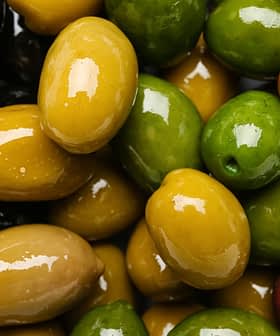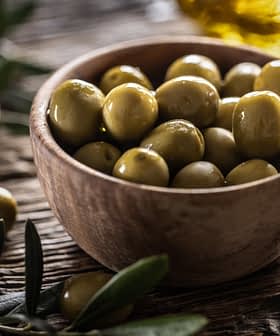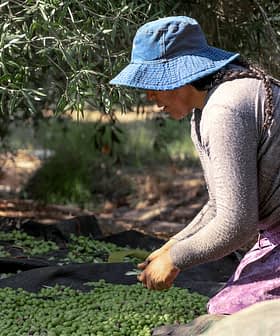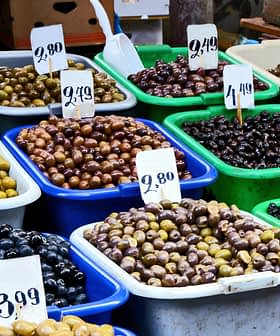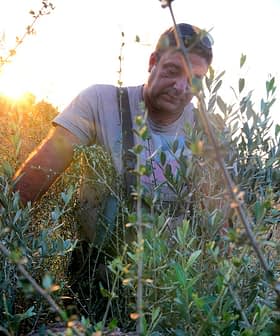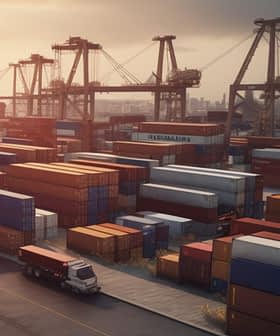Bell-Carter Cancels Table Olive Contracts in California
Citing the need to remain competitive in an increasingly global market as well as the high costs of production in California, the American table olive canner and retailer has canceled many of its contracts with local growers.
Bell-Carter has terminated many table olive purchasing contracts with California growers, citing the need to compete in a global marketplace and rising production costs for California olives. The affected growers, including Ud Shanker, are now left with unsold olives and are struggling to find new buyers, with some expressing concern about the impact of Spanish imports on the local industry.
Bell-Carter has terminated “many” of its table olive purchasing contracts with California growers, according to Tim T. Carter, the company’s CEO.
“This termination is effective immediately and we will not receive your harvest in 2019,” Carter wrote in a letter to growers, a copy of which was obtained by Olive Oil Times.
We don’t have any alternate buyers, and we are seeking to fill the void or suffer a loss. I’m not sure yet what to do if we are stuck with unsold olives.
In the letter, which was sent out to table olive producers at the beginning of this month, Carter cited the need to compete in a global marketplace and the increasing cost of production for California olives as two of the reasons for the cancellations of the contracts.
In a statement to Olive Oil Times, Carter declined to say how many contracts had been canceled.
“Bell-Carter competes in a global marketplace as a canner and marketer of table olives,” he said. “Unfortunately, due to rising cost increases for California olives, Bell-Carter made the necessary but difficult decision to release many California grower contracts.”
See Also:Table Olive News“While this decision is extremely difficult for us and for our many grower partners dating back three generations, it is imperative to remain competitive and viable,” Carter added.
These words, as well as the letter, came as little comfort to Ud Shanker, a table olive producer in California’s Central Valley.
“With the exception of a few years during the past 19 years, we have seen our olive production grow to exceed 20 tons,” Shanker told Olive Oil Times. “Some years we have produced more than 30 tons. All sold to Bell-Carter.”
Shanker now has an abundance of table olives and nowhere to send them. He is currently in the process of looking for new buyers, as are many other Central Valley producers who find themselves with full stocks and nowhere to send the olives.
“We don’t have any alternate buyers, and we are seeking to fill the void or suffer a loss,” he said. “I’m not sure yet what to do if we are stuck with unsold olives.”
Spanish olive oil giant DCoop and their Moroccan partner, Devica, bought a 20 percent stake in Bell-Carter last August in a move that was widely seen as a way for the Spanish company to evade United States-tariffs imposed on Spanish table olives. Bell-Carter denies that this is the case.
As part of the agreement, Dcoop and Devica have become the near-exclusive suppliers of Bell-Carter’s table olives, according to a statement made by DCoop’s president, Antonio Luque, last August.
Carter said, in spite of these cancellations, Bell-Carter would continue to source some of its table olives from California growers.
“While we have released many contracts, we will continue to maintain enough acres to support demand from customers that require California-grown olives,” he said.
This came as little solace to farmers, such as Shanker, who believe they are being unfairly outcompeted by Spanish imports.
“It’s cheaper to buy from Spain than from us,” Shanker said. ”[There is] no protection for local farmers.”
He believes that the United States and California should do something to protect American olive producers.
“It is immensely important for the U.S Department of Agriculture, California Department of Food and Agriculture or another organization to help olive growers,” Shanker said. “If soybean growers are getting grants, why not us?”
In July 2018, the U.S. Department of Commerce and the U.S. International Trade Commission found that Spanish table olive imports were hurting local producers after the latter received two complaints from Bell-Carter and another California olive producer.
These findings were then the basis for the imposition of tariffs on Spanish table olives, which ranged from 7.52 percent to 27.02 percent. DCoop and Devica proceeded to purchase their 20 percent stake in Bell-Carter the following month, which allowed the two companies to ship table olives to the U.S. to be oxidized and be packaged, before selling them in the country without having to pay the tariffs.
“What are we supposed to do?” Shanker asked. “This may destroy the local olive industry here.”


